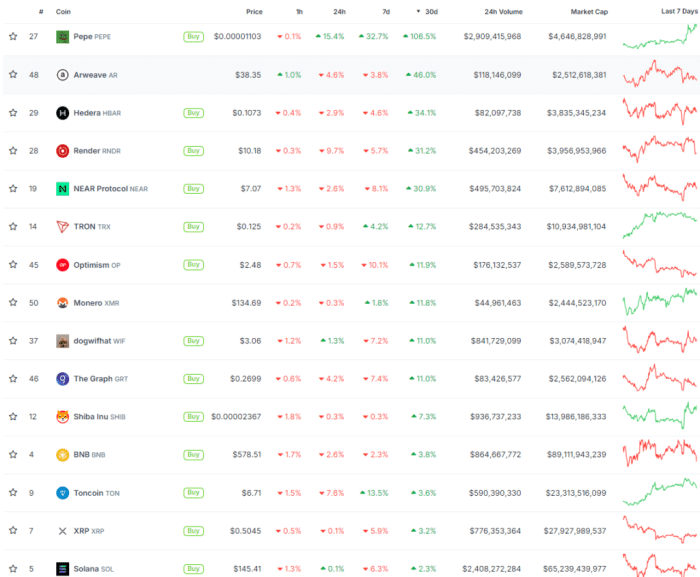With Risks of investing in altcoins at the forefront, this article delves into the unpredictable world of altcoin investments, shedding light on the potential pitfalls and challenges that investors may encounter.
Altcoins have gained popularity in the cryptocurrency market, but along with the promise of high returns comes significant risks that every investor should be aware of.
Risks of investing in altcoins

Cryptocurrency investments have gained popularity in recent years, with altcoins being a significant part of this market. Altcoins are alternative cryptocurrencies to Bitcoin, offering different features or use cases. While investing in altcoins can be lucrative, it comes with its own set of risks.
Volatility and Market Fluctuations
One of the main risks of investing in altcoins is the high volatility and market fluctuations associated with these digital assets. Prices can experience extreme swings in a short period, leading to significant gains or losses for investors.
Lack of Regulation and Security
Altcoins are often not subject to the same level of regulation as traditional investments like stocks or bonds. This lack of oversight can expose investors to security risks, including hacking, fraud, and scams within the cryptocurrency space.
Liquidity Risks
Another risk of investing in altcoins is the potential for liquidity issues. Some altcoins may have low trading volumes, making it difficult to buy or sell large quantities without significantly impacting the price. This lack of liquidity can result in challenges when trying to exit a position quickly.
When it comes to using Ethereum, understanding gas fees is crucial. Gas fees are the costs for transactions on the Ethereum network, and they can vary depending on network congestion and the complexity of the transaction. To learn more about how Ethereum gas fees work, check out this detailed guide on Ethereum gas fees explained.
Comparative Risks with Traditional Investments
When comparing the risks of investing in altcoins versus traditional investments like stocks or bonds, it’s essential to consider the level of regulation, market stability, and historical performance. While altcoins can offer higher returns, they also come with increased volatility and uncertainty compared to more established asset classes.
When it comes to understanding Ethereum gas fees, it’s essential to grasp the concept behind it. Gas fees on the Ethereum network are the costs associated with performing transactions or smart contracts. To dive deeper into Ethereum gas fees explained, check out this comprehensive guide Ethereum gas fees explained that breaks down everything you need to know about how gas fees work and why they fluctuate.
Volatility and Market Fluctuations
Investing in altcoins comes with its fair share of risks, with one of the most prominent being the volatility and market fluctuations in the cryptocurrency space. The prices of altcoins can experience drastic changes within short periods, making it a challenging environment for investors.
Impact of Market Fluctuations
Market fluctuations in altcoins can have a significant impact on investors’ portfolios. For instance, sudden price drops can lead to substantial losses for those who bought at higher prices. On the other hand, rapid price surges can create a fear of missing out (FOMO) among investors, causing them to enter the market at inflated prices.
- Example: In 2017, the price of Bitcoin surged to nearly $20,000 before experiencing a sharp correction, causing many altcoins to follow suit with significant price drops.
- Example: The recent market crash in May 2021 saw altcoins losing a significant portion of their value due to a combination of factors like regulatory concerns and environmental impact.
Strategies to Mitigate Risks
To navigate the volatility and market fluctuations in altcoins, investors can employ certain strategies to protect their investments:
- Diversification: Spreading investments across different altcoins can help mitigate the risk of a single coin’s price fluctuations impacting the entire portfolio.
- Setting Stop-Loss Orders: Implementing stop-loss orders can automatically sell altcoins at a predetermined price to limit potential losses in case of sudden market downturns.
- Staying Informed: Keeping up-to-date with market trends, news, and developments in the cryptocurrency space can help investors make informed decisions and react quickly to market changes.
- Long-Term Perspective: Adopting a long-term investment approach can help investors ride out short-term price fluctuations and focus on the underlying potential of the altcoin projects.
Security concerns and scams

When it comes to investing in altcoins, security concerns and scams are prevalent in the cryptocurrency market. It is essential to understand the risks involved in trading altcoins on various platforms and how to protect yourself from potential scams.
Security Risks in Altcoin Trading, Risks of investing in altcoins
Trading altcoins on different platforms can expose investors to various security risks, including:
- Phishing attacks: Hackers may create fake websites or emails that appear to be from legitimate altcoin exchanges to steal login credentials and personal information.
- Exchange hacks: Altcoin exchanges are susceptible to cyberattacks that can result in the loss of funds for investors.
- Malware and viruses: Installing malicious software on your devices can compromise the security of your altcoin holdings.
Common Scams and How to Avoid Them
Altcoin investors should be aware of common scams targeting them and take preventive measures to avoid falling victim:
- Ponzi schemes: Be cautious of investment opportunities promising high returns with little to no risk, as they are often Ponzi schemes that collapse, leading to financial losses.
- Initial Coin Offering (ICO) scams: Some ICOs may be fraudulent or fail to deliver on their promises, so it is essential to conduct thorough research before investing in any new altcoin projects.
- Fake wallets and exchanges: Only use reputable wallets and exchanges to store and trade altcoins, as fake platforms can steal your funds.
Security Measures of Altcoin Exchanges
Reputable altcoin exchanges prioritize security measures to protect their users’ assets, such as:
- Two-factor authentication (2FA): Adding an extra layer of security to login processes.
- Cold storage: Storing the majority of funds offline to prevent hacking attempts.
- Regular security audits: Conducting audits to identify and fix vulnerabilities in their systems.
Comparatively, lesser-known platforms may lack robust security measures, making them more susceptible to security breaches and scams.
Lack of regulation and legal uncertainties: Risks Of Investing In Altcoins
The lack of regulation and legal uncertainties surrounding altcoin investments can pose significant challenges for investors in various jurisdictions. Without clear guidelines and oversight from regulatory bodies, investors may face potential legal implications when investing in altcoins.
Regulatory Challenges
In different jurisdictions, altcoin investors may encounter regulatory challenges due to the decentralized and often anonymous nature of these digital assets. The lack of uniform regulations across countries can lead to confusion and uncertainty regarding the legality of altcoin investments. It is crucial for investors to stay informed about the regulatory landscape in their respective regions to avoid any legal issues.
Legal Implications
Investing in altcoins without clear regulations can have legal implications, such as tax liabilities, money laundering concerns, and potential involvement in illicit activities. The lack of oversight and accountability in the altcoin market can expose investors to fraudulent schemes and scams, leading to financial losses and legal troubles. It is essential for investors to conduct thorough due diligence and seek legal advice to mitigate these risks.
Navigating Legal Uncertainties
To navigate legal uncertainties when considering altcoin investments, investors should seek guidance from legal professionals specializing in cryptocurrency regulations. By staying compliant with existing laws and regulations, investors can reduce the risk of legal repercussions and ensure a safer investment environment. Additionally, staying updated on regulatory developments and industry best practices can help investors make informed decisions and protect their assets in the volatile altcoin market.
Closing Summary
As you navigate the realm of altcoin investments, it’s crucial to stay informed, exercise caution, and continuously assess the risks involved to make sound investment decisions in this volatile market.

